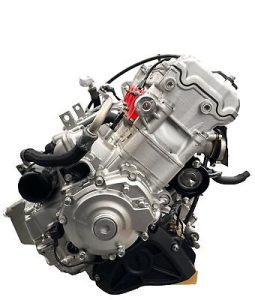A car engine running smoothly is a beautiful symphony of combustion and mechanics. But sometimes, that smooth operation can be disrupted by a noticeable shaking sensation in the vehicle. This engine shaking can be alarming for drivers, leaving them wondering what’s causing the issue and how to fix it.
The good news is that a shaking engine doesn’t necessarily spell doom for your car. In many cases, the causes are relatively common and can be addressed with repairs or maintenance. This guide will delve into the reasons behind why your engine shakes, the symptoms to watch out for, and what you can do to diagnose and address the problem.
Understanding the Symptoms: When to Suspect Engine Shaking
Not all engine vibrations are cause for concern. Modern engines naturally produce a slight trembling, particularly when idling. However, there are specific signs that indicate a more significant issue:

- Excessive Shaking: This is the most obvious symptom. If the shaking is violent enough to blur your vision or rattle objects inside the car, it’s a clear sign that something is wrong.
- Shaking at Specific Times: Pay attention to when the shaking occurs. Does it happen only at idle, while accelerating, or at highway speeds? Specific timing can point towards different causes.
- Loss of Power: If the shaking is accompanied by a noticeable loss of engine power, it could indicate a more serious problem with the engine’s ability to generate power.
- Check Engine Light: An illuminated check engine light often coincides with engine shaking, and the diagnostic codes it stores can provide valuable clues to the problem’s source.
If you’re experiencing any of these symptoms, it’s important to address the issue promptly to prevent further damage to your engine and ensure safe driving conditions.
Common Culprits: Unveiling the Causes of Engine Shaking
Several factors can contribute to engine shaking. Here’s a breakdown of some of the most frequent causes:

- Engine Misfiring: This occurs when one or more cylinders fail to combust fuel properly. It can be caused by faulty spark plugs, worn-out ignition coils, or problems with the fuel injection system. Engine misfiring can cause a jerking sensation and significant shaking.
- Ignition System Issues: As mentioned above, malfunctioning spark plugs or ignition coils can lead to misfiring and engine shaking. Worn spark plugs may not generate a strong enough spark to ignite the fuel efficiently, while faulty coils can disrupt the proper delivery of spark to the cylinders.
- Vacuum Leaks: Leaks in the engine’s vacuum system can cause unmetered air to enter the engine, disrupting the air-fuel mixture. This lean air-fuel mixture can lead to incomplete combustion and engine shaking.
- Engine Mounts: These rubber mounts secure the engine to the car’s frame and absorb vibrations. Over time, engine mounts can wear out and crack, allowing the engine to move excessively and causing shaking in the cabin.
- Fuel System Problems: Clogged fuel injectors or a dirty fuel filter can hinder proper fuel delivery, leading to a lean air-fuel mixture and engine shaking. Dirty fuel injectors may not properly atomize the fuel, resulting in uneven combustion.
- Internal Engine Issues: In severe cases, engine shaking can be caused by more serious internal problems like worn piston rings, damaged valves, or crankshaft issues. These problems require professional diagnosis and repair.
Diagnosing the Cause: Taking Action to Stop the Shakes
If you suspect your engine is shaking, there are steps you can take to diagnose the cause:

- Visual Inspection: Pop the hood and look for any obvious signs of trouble, such as loose hoses, cracked components, or disconnected wires.
- Check Engine Code: If your check engine light is on, retrieve the diagnostic trouble codes (DTCs) stored by the car’s computer. These codes can point towards specific components or systems that may be malfunctioning.
- Seek Professional Help: For a more accurate diagnosis, consider consulting a certified mechanic. They have the expertise and tools to pinpoint the exact cause of the shaking and recommend the appropriate repairs.
Rev Up Your Repair Plan: Solutions for a Smooth-Running Engine
Once you’ve identified the cause of the engine shaking, you can address the issue with repairs or maintenance. Here are some common solutions:

- Spark Plug Replacement: Replacing worn-out spark plugs with fresh ones can often resolve misfiring and engine shaking.
- Ignition Coil Repair/Replacement: Faulty ignition coils need to be repaired or replaced to ensure proper spark delivery to the cylinders.
- Vacuum Leak Repair: Sealing any vacuum leaks will restore the proper air-fuel mixture and eliminate shaking caused by unmetered air entering the engine.
- Engine Mount Replacement: Worn engine mounts should be replaced to dampen engine vibrations and prevent shaking in the cabin.
- Fuel System Cleaning: Cleaning clogged fuel injectors or replacing a dirty fuel filter can restore proper fuel flow and address shaking caused by a lean air-fuel mixture.
In severe cases where internal engine problems are identified, repairs may involve replacing worn pistons or rings, fixing damaged valves, or addressing crankshaft issues. These repairs should be entrusted to a qualified mechanic.
Preventive Maintenance: Keeping Your Engine Shake-Free
The best way to deal with engine shaking is to prevent it from happening in the first place. Here are some preventative maintenance tips:

- Regular Spark Plug Changes: Replace your spark plugs at the intervals recommended in your car’s owner’s manual. This ensures optimal performance and helps prevent misfiring.
- Ignition System Maintenance: Schedule regular inspections of your ignition system components, including spark plugs, ignition coils, and spark plug wires.
- Air Filter Replacement: A clean air filter ensures clean air enters the engine, promoting efficient combustion and preventing shaking. Replace your air filter according to the manufacturer’s recommendations.
- Fuel System Cleaning: Consider periodic fuel system cleaning services to remove built-up deposits in the fuel injectors and maintain proper fuel flow.
- Listen to Your Engine: Pay attention to any unusual noises or vibrations coming from your engine. Early detection of problems can help prevent minor issues from escalating into major repairs.
By following these preventative measures, you can keep your engine running smoothly and avoid the unpleasant experience of engine shaking.



